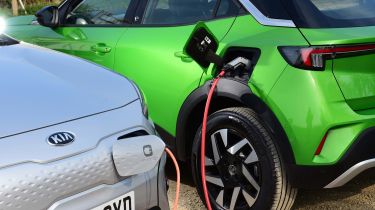UK plug-in car grant extended for existing orders
The Plug-in Car Grant (PiCG) was axed back in June 2022, but will now apply to existing orders processed before 31 March 2023

The UK government has temporarily reintroduced the Plug-in Car Grant (PiCG) due to the continuing delays in manufacturing supply chains, including the conflict in Ukraine and the global semiconductor shortage.
The grant will be applied to all existing electric car orders placed between June 2022, when the grant was discontinued, and 31 March 2023, with the same terms as before: £1,500 off the list-price of any electric car costing £32,000 or less. This means only the cheapest electric cars on sale will be eligible for the grant.
A Department of Transportation (DfT) spokesperson confirmed the 18-month extension of the grant to DrivingElectric, adding: “we will continue to work with industry and monitor issues impacting the supply chain issues.”
Importantly, the grant does not apply to new orders, only to those that have been placed but not fulfilled, due to ongoing delays. The DfT said: "To emphasise, this extension does not relate to the consumer window for applying, but for the window industry has for fulfilling orders made through the scheme."
Before it was stopped, the PiCG supported the purchase of roughly 500,000 new electric cars in the UK. Having paid out a total of £1.4 billion in plug-in grants between 2011 and mid-2022, at the time it was withdrawn the government said it was refocusing funding towards the installation of more charging points across the UK and boosting sales of other types of electrified vehicles, such as vans, trucks, taxis, motorcycles and wheelchair accessible vehicles.
Defending its decision to end the grant, the government said that: “successive reductions in the size of the grant and the number of models it covers have had little effect on rapidly accelerating sales or on the continuously growing range of models being manufactured.”
Mike Hawes, chief executive of industry body the Society of Motor Manufacturers and Traders (SMMT), was critical of the decision: “The decision to scrap the grant sends the wrong message to motorists and to an industry which remains committed to the government’s Net Zero ambition.”
“While we welcome the continued support for new electric van, taxi and adapted-vehicle buyers, we are now the only major European market to have zero up-front purchase incentives for EV buyers, yet the most ambitious plans for uptake. With the sector not yet in recovery and all manufacturers about to be mandated to sell significantly more EVs than current demand indicates, this decision comes at the worst possible time.”
Other UK government incentives for potential electric-car buyers, such as the 2% Benefit-in-Kind (BiK) company-car tax and zero road tax for all EVs, remain in place.
